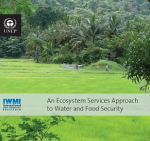Launched during World Water Week, the report notes that, in many areas, increased food production through agricultural intensification has come at the expense of ecosystem services, such as biodiversity, pollination, and soil erosion protection, due to pollution from agricultural run-off, or the diversion of water from rivers to farmland.
 22 August 2011: The UN Environment Programme (UNEP) and the International Water Management Institute (IWMI) have released a report titled “An Ecosystems Approach to Water and Food Security.” The report finds that healthy ecosystems can form the basis for sustainable water resources and stable food security, improve climate change resilience, and provide economic benefits to poor communities.
22 August 2011: The UN Environment Programme (UNEP) and the International Water Management Institute (IWMI) have released a report titled “An Ecosystems Approach to Water and Food Security.” The report finds that healthy ecosystems can form the basis for sustainable water resources and stable food security, improve climate change resilience, and provide economic benefits to poor communities.
Launched during World Water Week, which is organized by the Stockholm International Water Institute (SIWI) and is taking place from 21-27 August 2011, in Stockholm, Sweden, the report recommends that policymakers consider farmland, fisheries and other agricultural areas as “agroecosystems.” In many areas, it says, increased food production through agricultural intensification has come at the expense of ecosystem services, such as biodiversity, pollination, and soil erosion protection, due to pollution from agricultural run-off, or the diversion of water from rivers to farmland.
UNEP and IWMI recommend closer collaboration between government authorities in agriculture, environment, forestry, fisheries and other sectors. It also highlights the potential role for incentives, including paying farmers to plant and maintain trees on their land, to bolster ecosystem services and their contribution to water and food security. [UN Press Release] [UNEP Press Release] [Publication: An Ecosystem Services Approach to Water and Food Security] [Website of World Water Week]